Sunday, December 22, 2024 09:39 AM
Buzkashi Resurgence in Northern Afghanistan
- Buzkashi sees increased participation and public interest.
- Concerns raised over authenticity due to hired Chapandazs.
- Call for improved infrastructure to support the sport.
 Image Credits: menafn
Image Credits: menafnBuzkashi, a traditional Afghan sport, is experiencing a resurgence in northern regions, attracting more participants and spectators.
The ancient sport of Buzkashi, a traditional game deeply rooted in Afghan culture, has recently experienced a remarkable resurgence, particularly in the northern regions of Afghanistan. This game, which involves horse riders known as Chapandazs competing to capture a headless goat or sheep, is not just a sport; it is a vibrant part of the country’s cultural heritage. As interest in Buzkashi grows, so does the number of participants and spectators, making it a significant social and cultural event.
In the province of Samangan, the head of the Buzkashi Federation, Zabihullah Hajizada, noted a substantial increase in public interest. He stated, "On Fridays, Buzkashi matches are held in the Qara Shabaq field of Samangan, and the public presence is very strong." In previous years, only a handful of horse riders participated, but now hundreds of skilled horses and renowned champions gather, attracting thousands of fans. This shift highlights the growing enthusiasm for the game.
Buzkashi matches are categorized into official and unofficial games. Official games are organized as leagues and tournaments, while unofficial games maintain traditional formats. However, Hajizada expressed concern over the practice of hiring Chapandazs from other provinces, which he believes undermines the authenticity of the sport. He urged sports authorities to address this issue to preserve the integrity of Buzkashi.
Young horse rider Samiallah shared his perspective on the improvements in Buzkashi facilities. He mentioned the establishment of official Chapandaz clubs and the introduction of faster, stronger horses, which have contributed to the rise of new champions. Despite these advancements, he lamented the lack of a suitable field for provincial games, calling on the National Buzkashi Federation to create a standard venue.
In Balkh, Sarwar Pahlawan, a seasoned horse rider, reflected on the growth of Buzkashi over the past two decades. He noted, "In these 20 years of my presence in this field, I have seen a large increase in the number of our fans." His hope is that future generations will continue to embrace this sport, ensuring its legacy endures.
Meanwhile, Ghulam Khudai from Badakhshan emphasized the deep-rooted interest in Buzkashi among the local population. He remarked, "People in Badakhshan have always had a deep interest in this traditional game, which has been passed down to us from our ancestors." This sentiment is echoed by Azizullah Pahlawan from Baghlan, who highlighted the importance of strong horses for Chapandazs and expressed optimism about Afghanistan's potential to compete internationally.
As spectators like Painda and Jumah Gul express their excitement for the game, they also call for improvements in infrastructure, particularly the construction of standard fields. They believe that having proper venues will enhance the experience for both players and fans, fostering a more vibrant Buzkashi culture.
In response to these concerns, Ghulam Sarwar Jalal, head of the National Buzkashi Federation, acknowledged the challenges of building standard fields due to budget constraints. He mentioned efforts to seek donors and potential collaborations with international partners to improve facilities. Jalal emphasized that the federation is committed to developing Buzkashi and ensuring it remains a cherished part of Afghan culture.
The revival of Buzkashi in Afghanistan is a testament to the resilience and passion of its people. As interest in this traditional sport continues to grow, it not only strengthens community bonds but also preserves a vital aspect of Afghan heritage. With ongoing support and investment in infrastructure, Buzkashi can thrive, inspiring future generations to partake in this exhilarating and culturally significant game.













